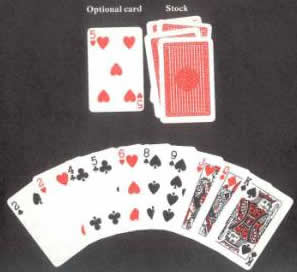COLONEL
COLONEL is a versions of Coon Can, adapted for fewer players and with fewer cards.
NUMBER OF PLAYERS
Colonel is for two players only.
CARDS
The full standard pack of 52 cards is used, poker cards ranking from Ace (high) to 2 (low).
The players cut for deal, and the higher deals. Each player is dealt ten cards, one at a time. The rest of the pack is placed face downwards on the table, between the players, and the top card (known as the optional card) is turned face upwards and placed alongside the stock.
THE PLAY
The object of the game is to make sequences of the same suit, or threes or fours of a kind, and declare them by placing them face upwards on the table. The hand ends when one of the players has declared all his cards.
A sequences must be of at least three cards, but once it has been declared either player, in his turn, may add to it. In the same way, if three of a kind has been declared, either player in his turn may add the fourth card to it.
The non-dealer plays first. He takes into his hand either the optional card or the top card of the stock. He declares any sequences, or threes or fours of a kind that he holds, and discards a card from his poker hands.
The discard is placed on top of the optional card, or in its place if the optional cards has been taken up. The dealer plays next. He has the choice of taking the card that the non-dealer has discarded or the top card of the stock

It will be seen, therefore, that the routine of the play is very simple. Each player in turn takes into his hand either the top card of the stock or the card his opponent has discarded, he then declares any sequences, threes or fours that he holds, or adds to those already declared either by himself or his opponent, and then discards a card from his hand.
In a sequence the Ace is high. A player is not under compulsion to declare: indeed it is good play to refuse to declare for as long as possible in an attempt to declare one’s hand all at once.
This way one’s opponent has less chance to declare all his cards, but it is to be borne in mind that a player who fails to declare when he can runs the risk that his opponent will go out before him.
When a player has declared all his cards, his opponent loses points for every card remaining in his hand, the Ace, King, Queen and Jack counting as 10 points each, the remaining cards their pip values.
If the stock is exhausted before either player has declared all his cards, both player show the cards remaining in their hands and the player with the lower total wins the hand. He adds to the score the total of his opponent’s hand less that of his own.
A refinement of the game is that before the stock is exhausted either player may challenge. If the challenge is rejected by the opponent, the hand continues to be played out. If , however, the challenge is accepted, both players expose their hands and the player with the lower total wins.
He adds to his score the total of his opponent’s hand without deducting his own. If the right cards to make sequences and threes of a kind are not coming to a player, it is good play for him to fill his hand with low poker cards and then challenge.
